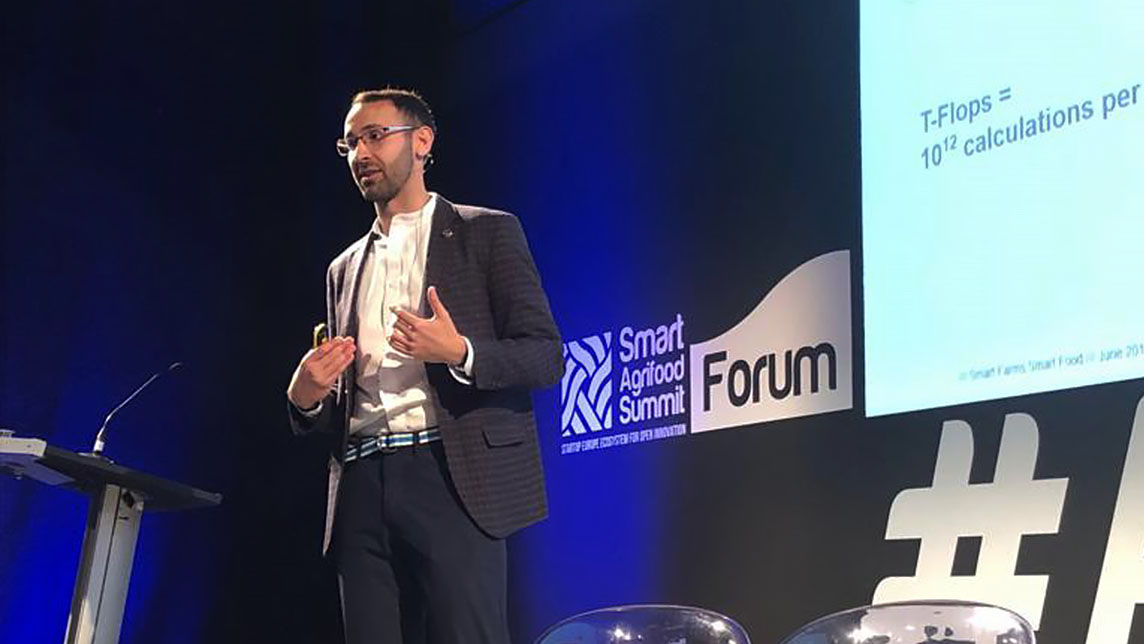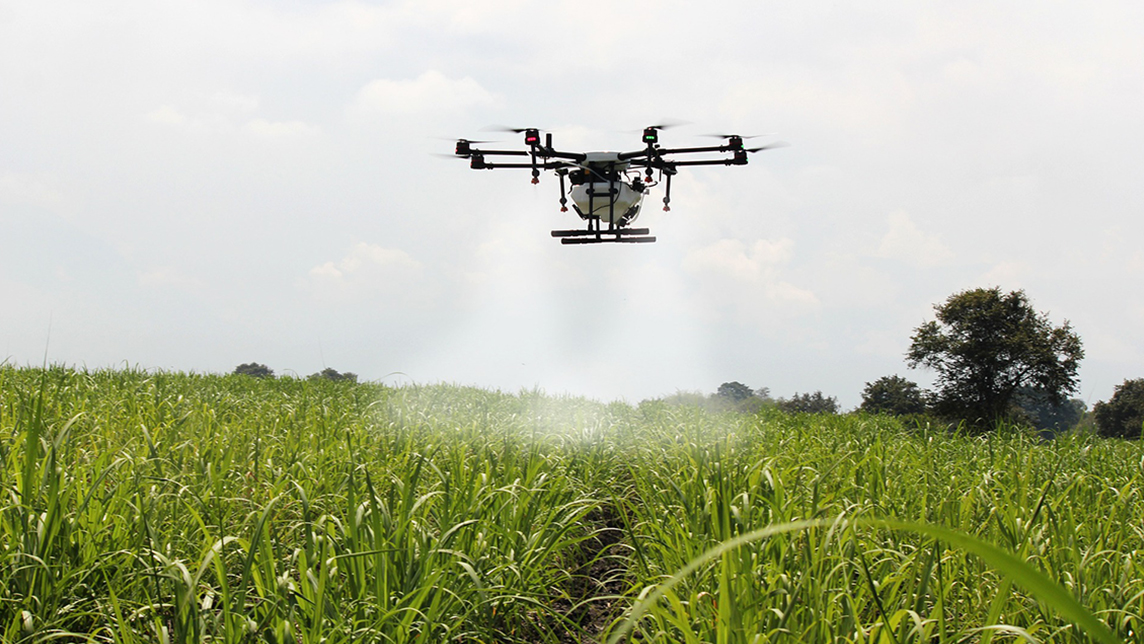Armed with a bachelor’s degree in Biology and an MBA from Washington University in St. Louis, with strong connections to the agriculture, biotechnology and digital communities, Paimun Amini, Director of Venture Investments for Bayer Growth Ventures (BGV), is focused on channeling BGV funds into several crop-science ventures.
BGV facilitates collaborations, partnerships, mergers and acquisitions between emerging companies and the broader Bayer enterprise. Amini, who is based in Silicon Valley, is also director of partnerships and innovation at Bayer.
Corporate venture capital, or CVC, has evolved over the last decade. Today, 52% of Fortune 100 companies have their own investment arms and 77% invest in VC firms. BGV invests in companies it thinks will have a major impact in the agricultural, healthcare and pharmaceuticals sectors.
This interview has been edited for length and clarity.
Q: Why did you come to the Smart Agrifood Summit?
A: I came here to connect the innovations coming out of here with the supporting times. Europe, as with other regions, has its own regulations and stipulations to have more opportunities to innovate, focus on and address hedge funds. So it’s very exciting to meet so many companies as I did here today. John Hartnett and his team [from SVG Ventures in Silicon Valley] helped to organize this, and they are amazing investors as well, so I am very excited to come.
The evolution of interesting technologies in the world today offers the opportunity to test technologies to solve crop problems, like insects. And we saw some of that here.
Have you met with any startups that got your attention?
I was lucky enough to be part of a pitch competition in which we saw over 20 companies, so a number of them are very proxy stars.
In terms of their technologies or business models?
Both. You saw companies [in the agriculture sector] that were doing anything from new marketplaces to new biological solutions, to sick-crop protection, so there is a great range of technologies.
Which type of technologies are you more interested in?
We see digital technologies transforming the way farmers connect to each other as well as understand their farms themselves. As for biological solutions, we obviously have a great amount of work invested in that space, so we always will be interested in it.
Are you looking for startups that are in a specific vertical in the agriculture sector?
Yes. We have seven investment priority areas… [but] I am going to focus on two of them. One is sustainable crop production. That goes back to our commitment to decrease the environmental impact we have in the world by 30% by 2030. For this, there are new solutions, whether they are mechanical solutions or biological solutions, or whether they just concern manipulation. They are helping us control hazards about disease, weeds and any other farm matter, so sustainable profit technologies are going to be key for us.
On the other side of the space, we are interested in the digital world. In this sense, we are interested in the kind of platform that has helped farmers and their millions of acres to produce the optimal crop they can in any given amount of time.
However, we realize that there is a lot of data that needs to be put into the work that we do. There is a digital opportunity to connect farmers closely to consumers, so we are also participating to understand all of these technologies and networks as well.
Are you targeting companies that are linked to the type of activities Bayer develops, or you work independently as a venture capitalist?
The exciting thing about what we do is that Bayer's crop scientists are the world leaders in agriculture, so we try our crop scientists to dominate digital technology related to agriculture.
When we invest in a startup we are really looking for two things: a great team and great technology. It allows us to work on an experiment or hypothesis. So if they have a new idea, we can work with them and develop that hypothesis, or develop that technology without having to try to hire a whole staff to do it.
We are never going to be experts in creating drones [for agricultural use], and we are never going to be experts in some of the solutions that are being developed with the technology today, but if we work with great scientists and great technology outside of [Bayer], it’s a different way to participate in that disruption.
And in the long term, would you look to keep the companies in your portfolio as Bayer investments, or apart from Bayer? Or is Bayer interested in acquiring them?
There have been a couple of companies in our VC portfolio that we have acquired as the digital Bayer Crop Science platform, but the reason we partner with a company is because we have a basic interest in their work. It could either be in licensing their technology, being a customer of their technology or possibly acquiring them in the long run. It should be an area that is tangential to the technology we are developing ourselves today.
What are the main difficulties you find when you are selecting companies? What are their deficiencies?
I think something we see with a lot of entrepreneurs is that, whether here in Europe or in the States, or in any other city worldwide, they tend to have great technology but do not quite understand the farmers or how to access that customer base. And that tends to be a limitation. So getting to 100,000 actors is an accomplishment, but getting to 5m is very, very difficult.
So that is one of the aspects that tend to be hard for innovators in this space.
Are you able to help them with that?
That is our advantage as a corporate venture capital investor, as we have a huge base of customers who are in billions of acres worldwide, and we can help them access those as part of our offering in helping to develop these companies.
Do you offer them the possibility of testing, partnering with farms so they can test their technology?
It depends on the investment they need. A lot of times when we invest in these companies we have a separate proper research agreement, which will include the testing for their product.
And to invest in them do you have any conditions, regarding equity, for instance? If they already have some shareholders that are not part of the founding team, but other VCs, would you still invest in them?
Yes, we do syndicated investment all the time. And that has happened with the majority of our investments. [If] we decide we should take 25% or less, that means there are going to be plenty of other investors.
And do you have any kind of planning? For example, to invest in 10 startups a year, or 20, or …?
There is not a hard investment number presently. We usually go each year over 200 companies. We do greater [due] diligence on over a hundred or so. So I cannot give you a specific number, because we do not know when we see a company if we are going to pull the trigger and make sure we can help them [achieve] the best way to grow.

Out of the companies you have looked at, how many have you actually invested in?
Yes, so far we have invested in 12 companies. Two of these companies we have acquired ourselves and a few we have exited successfully. Other acquisitions are growing now.
How big is your team?
The VC team is me and Derek Norman [the vice-president of BGV]. Derek worked for more than nine years in Syngenta, serving as Head of Corporate Venture Capital and Managing Director. We have a “farmer side” of our investment team and a consumer side; we are the Crop Sciences team, Derek and myself. As for the size of the broader investment team, I do not have the specific number now.
How much money do you have to invest in these companies?
We will invest up to US$10m in a given round, seed to Series C. We should not go past that quantity. So that is our VC kind-of principle – there is no minimum but there is a maximum.
And you said that you want to be part of the leading team in the company when you invest in someone?
It depends on the state of the company and on what we seek as an investment, but we do like to remain active with our companies and help them grow. So from a CVC standpoint, we want to make sure that they have the resources they need to work, and usually the best way to do that is to be active within the board or as an observer.
The 12 companies in your portfolio, are they from all over the world, or do you focus on certain countries to invest in?
The majority of them are based in the US. We have also an investment in Madrid here, and another in Brazil. And the geographic location is not a limiting principle. We aim to invest where the best technologies are.
And do you see a rise in interest in sustainable farming?
Yes.
In terms of numbers, there has been a spike in socially responsible investment. Investors no longer only seek financial returns, they want to be socially or environmentally responsible, too.
Right.
Why is that so?
Consumers are becoming more conscious about issues such as sustainability. Farmers have to meet the demands of the consumer as well. And as we have better technology, we are becoming more conscious of how technology can help us to achieve that. So farmers can have a sustainable farm and also meet the demands of consumers.
What is BGV's plans over the short, medium and long term?
What we have been doing here for the last couple of months is reviewing our portfolio. We will be very active in the next few months, and hopefully in the next six months to a year we will see a good number of kids coming to us and working here.
It seems there is saturation in other tech sectors, but do you see a lot of potential in agriculture?
There is in our specific industry, so our context continues to grow. There is still a very active market, and you see other investors coming to the agtech space who had never thought about it before. So there is more interest in the agriculture space than ever before, and I think that it will continue.
Is that a good or bad thing for Bayer?
I think if there is support for innovation in agriculture, it’s always going to be a good thing.
How do you see the agriculture sector in the next five to 10 years?
I think I have to go back to the smart farm model where you use the sustainability practices that work, you are using technology in order to measure how your farm is doing, you are using analytics to support your decisions, you are using layered technology.
So I think we are going to see very savvy farmers, looking forward in the future five to 10 years, and we are going to see farmers have always been savvy scientifically, anyway, almost better than anyone else. But I think we are going to see them embrace the new tools: technologies that are going to come up here in the next five to 10 years that are going to transform the way farms produce.












